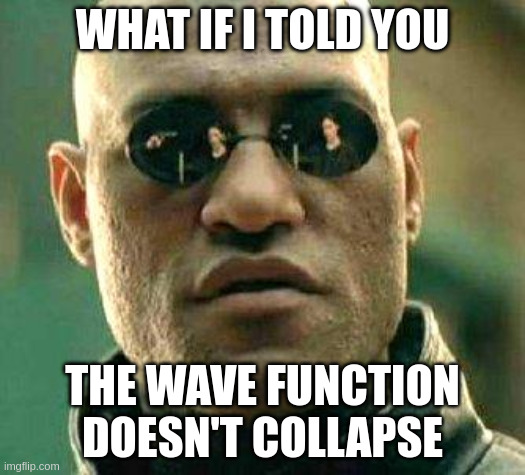Wavefunction Collapse
Wavefunction Collapse
Title text: Wavefunction collapse is only one interpretation. Under some interpretations, graduate students also have souls.
Wavefunction Collapse
Title text: Wavefunction collapse is only one interpretation. Under some interpretations, graduate students also have souls.
John Bell demonstrated why the "good" response is in fact a bad response as well in his article "Against Measurement".
I just read that paper and I don't think that what Bell meant.
"When I say measurement is worse than the others, I do not have in mind the use of the phrase, 'Measure the mass and width of the Z boson.' "
https://www.informationphilosopher.com/solutions/scientists/bell/Against_Measurement.pdf
He then goes on to suggest that measurement in it's bad use should be replaced with experiment which is the equivalence the xkcd comic makes.
The "good" part in the comic simply says we should replace "observation" with "measurement," but Bell is unambiguously clear in black-and-white in that article that "measurement" is a poor replacement because what constitutes a "measurement" is not rigorously well-defined.
It would seem that the theory is exclusively concerned about 'results of measurement', and has nothing to say about anything else. What exactly qualifies some physical systems to play the role of 'measurer'? Was the wavefunction of the world waiting to jump for thousands of millions of years until a single-celled living creature appeared? Or did it have to wait a little longer, for some better qualified system . . . with a PhD?
"Measurements" are complex high-level abstract things. Bell believed a physical theory should just directly describe physical reality, and this would naturally translate into what you measure, rather than including "measurement" as a fundamental part of the theory itself, which he saw as backwards to how a physical theory should be formulated. It does not tell you how the physical system is actually behaving if no humans are around to measure it.
If the theory is to apply to anything but highly idealised laboratory operations, are we not obliged to admit that more or less 'measurement-like' processes are going on more or less all the time, more or less everywhere? Do we not have jumping then all the time?
This was also one of Einstein's main gripes about how some people talk about quantum mechanics in a way that uses observation or measurement as a fundamental postulate to the theory. He gave an example of atomic decay, where quantum mechanics does not give you any definite time when a decay product will appear, but merely a wave function that spreads out in space over time, which from that you can compute a probability distribution that you will find a decay product there if you were to measure it, but then it doesn't tell you at all what the atom is actually doing if you don't measure it. That's why he once asked Abraham Pais if really believed that the moon exists only if he looks at it.
Bell wanted a formulation of QM that did not at all make reference to measurement devices as a fundamental concept. Einstein as well stressed that he thought physics should be about physical reality, not observations/measurements of physical reality. The physical theory should explain what you observe, but you should not have to invoke measurement devices as a foundational concept to a physical theory.
The measurement device itself should be reducible within a physical theory. You should be able to use physics to explain the behavior of my photon detector. My complicated macroscopic photon detector built by humans should not be treated as a fundamental irreducible component to a physical theory. Bell even says outright in that article he thinks it would be a good idea to ban the word "measurement" in papers to require people to frame things in terms of the microscopic physical systems that are being measured themselves rather than to macroscopic measurement devices.
I think people seriously misinterpret what "observation" means on a quantum level. I think a better term would be "interact" - you cannot observe something without interacting with it in some way (e.g. a photon hitting it). In that sense, the interaction is what collapses the wavefunction, not whether or not you are present to observe it.
you cannot observe something without interacting with it in some way
Well that's both confusing and fascinating - so it's basically quantum Russian roulette

Graduate students had souls. They sold it long ago for a PB&J because they can’t afford any food.